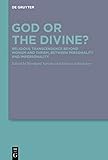God or the Divine? : Religious Transcendence beyond Monism and Theism, between Personality and Impersonality / ed. by Marcus Schmücker, Bernhard Nitsche.
Material type: TextPublisher: Berlin ; Boston : De Gruyter, [2023]Copyright date: ©2023Description: 1 online resource (X, 518 p.)Content type:
TextPublisher: Berlin ; Boston : De Gruyter, [2023]Copyright date: ©2023Description: 1 online resource (X, 518 p.)Content type: - 9783110698169
- 9783110698411
- 9783110698343
- 211 23
- online - DeGruyter
- Issued also in print.
| Item type | Current library | Call number | URL | Status | Notes | Barcode | |
|---|---|---|---|---|---|---|---|
 eBook
eBook
|
Biblioteca "Angelicum" Pont. Univ. S.Tommaso d'Aquino Nuvola online | online - DeGruyter (Browse shelf(Opens below)) | Online access | Not for loan (Accesso limitato) | Accesso per gli utenti autorizzati / Access for authorized users | (dgr)9783110698343 |
Frontmatter -- Table of Contents -- Preface -- Introduction -- Dimensions of Human Existence as Dimensions of the Hermeneutics of Transcendence -- God or the Divine? -- Transcendence in Difference to Creation: A Christian Essential as a Problem of Modern Philosophical Theorizing -- I Buddhism -- The “Entangled” Presence of the Unconditioned: A Buddhist Vision of “Transimmanence” -- Effort and Grace in Relationship with the Transcendent in Buddhism -- Nirvāṇa as “Unconditioned” (asaṃskṛta) and “Transcendent” (lokottara) Reality -- Considerations on the Inappropriateness of the “Transcendence” Paradigm to the Hermeneutics of Buddhist Scriptures -- The World Transcendent. A Madhyamaka Interpretation -- Is All-Unity a Possibility in Mahāyāna Thought? Some Musings Centering on Huayan Expositions of the Net of Indra -- Unity of Consciousness in Buddhism -- Dependent Arising (pratītyasamutpāda) and the Problem of Continuity: Does the Concept Lead to an Idea of All-Unity? -- Jinen as Transcendent Reality in Shinran -- The Status of Amida Buddha as a Person: Henri de Lubac’s Encounter with Pure Land Buddhism -- The Tetralemma, the Two Truths, Skilful Means, and Divine Personality -- II Hinduism -- Potters, Human and Divine: Manifesting Śaṅkara’s Īśvara through Pedagogy, Playdough, and Personhood -- Ontological Interpretation of Śaṅkara and the Question of Non-Dualism -- The World and the (Non)Transcendent: A Reflection on Some Abundant and Elusive Possibilities from the Brahminical Traditions -- The Supreme Being: A Person? -- Gnoseological Interpretation of Śaṅkara: A Proposal for the Relationality of Saguṇa and Nirguṇa Brahman -- Śiva’s Claim to Identity: Can Personalism in a Theistic Tradition of a Strict Identity Survive? -- The Bhedâbheda (Difference and Non-difference) of Nimbārka -- Madhva’s Concept of Divine Personality and Personalism -- “The Deepest Insoluble Embarrassment of Abstract Monism”: Śaṅkara and Schelling on the Origin of the Finite World of Appearance -- Theology in Poetry: Divinity, Humanity, and the Natural World in Veṅkaṭanātha’s Haṃsasandeśa -- Aesthetic Experience as a Mediator Between Personal and Impersonal Transcendence -- How Can Christian Theology and Hinduist Theology have Resonance? -- Blurry Vision as Transcendence: Lessons from Non-dual Śaivism -- The Divine Gift according to Rāmānuja, Sudarśanasūri and Veṅkaṭanātha -- Contributors -- Index
restricted access online access with authorization star
http://purl.org/coar/access_right/c_16ec
Is there a language of transcendence which does not fall under the well-worn categories of monism, theism, pantheism, biblical or pagan monotheism, personal or tripersonal God, or an impersonal absolute, conceived as immanent and/or transcendent? The present set of studies from different fields of research centers on the question whether it is possible to speak at all of transcendence or a divinity, and if it is, under what limitations does such speech proceed. In current discussion in theology and in philosophy of religion, there is a pervasive awareness that the inherited terms and alternatives, developed in the western tradition, no longer facilitate an adequate understanding of the divine. Increasing familiarity with the languages of ‘immanence’ and ‘transcendence’ (under erasure) in Hindu and Buddhist thought has further jumbled our coordinates, while holding out the promise of a more subtle and vital engagement with the matter itself of religious inquiry. A further long-established distinction, between ‘personal’ and ‘impersonal,’ also takes on rich new hues in Asian contexts, where the very notion of ‘person’ may undergo unsettling critiques. Transgressing the categories of ‘personal’ and ‘impersonal’ points to the mystical depth of religious traditions, emphasizes their openness and reintegrates essential elements of both perspectives. Advancing with curiosity and caution, all the contributors take seriously the diversity of historical religious traditions, while nevertheless searching for a fresh language that may connect these traditions and provide a common ground of understanding.
Issued also in print.
Mode of access: Internet via World Wide Web.
In English.
Description based on online resource; title from PDF title page (publisher's Web site, viewed 06. Mrz 2024)


